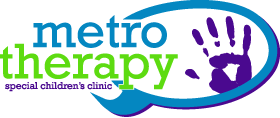
Developmental Milestones for Your Toddler’s Fourth Year
This guide breaks down the key developmental milestones your toddler should reach between 3 years old and 4 years old. Understanding these milestones is the first step to actively supporting your toddler’s growth and setting them up for school readiness. If you have any questions or concerns, feel free to reach out to the Metro Therapy team at (763) 450-9400 today and we’ll be happy to help.
Development at 4 Years Old
By the time your child is about 4 years old, they should achieve the following new skills:
Speech & Language
Repeats or sings words from songs or nursery rhymes
Able to answer simple questions like, “What is an umbrella for?”
Says sentences using at least four words
Tells you things that happened during the day
Others can understand them when they speak
Cognitive
Names the colors of items when you point them out
Draws simple people (with at least three body parts like a head, body, and arms)
Tells you what comes next in a story they have heard several times
Asks lots of questions
Recognizes some letters and numbers
Follows 3-step instructions (“Take off your shoes, wash your hands, and come eat.”)
Movement
Able to unbutton larger buttons
Holds crayons, markers, or pencils between their fingers and thumb
Able to catch a large ball
Puts together their own food or drink with supervision
Hops on one foot without falling over
Runs with more confidence and coordination
Social & Emotional
Asks to go play with friends
Enjoys helping others when they can
Changes their behavior to fit the environment (like a church, a store, etc.)
Pretends to be someone or something else, like a superhero, a princess, etc.
Offers comfort to others when they are sad or hurt
Avoids dangerous situations, like jumping from high playground equipment
Feeding
Able to feed themselves without making a mess
Chews food enough to prevent choking
Swallows food and drink without coughing or choking
Enjoys a variety of nutritious foods
Frequently Asked Questions
-
The best thing to do for your child to prepare them for school is to give them plenty of opportunities each day to learn and explore. Encourage them to ask questions about things they don’t know or don’t understand, and do your best to answer them. Spend time playing or walking outdoors. Help them practice learning the ABC song, counting things, and reading stories. When you make learning fun, encourage them to try, and acknowledge their efforts, you can help set your 4-year-old up for success in school.
-
Play is a fantastic learning tool for children. Simple games like puzzles, coloring pages, I Spy, and scavenger hunts can help your child develop important cognitive and fine motor skills. Playing tag, hide-and-seek, and catch also helps develop your child’s fine and gross motor skills for effective movement. Telling stories and playing pretend are great ways to develop speech, language, and social skills. You really can’t go wrong with play so long as you choose age-appropriate activities and get your child moving and thinking.
-
Some 4-year-olds are ready to join little league sports, but not always. It really depends on your child, their interests, and their skills. You can always check your local community centers for activities and groups for your 4-year-old that will help them practice new skills and make new friends.
-
Screen time should be limited to about 1 hour per day of age-appropriate content. Educational programs are best because your child can enjoy watching a show or playing a game with you while still learning something new. You can also talk with your child about the shows or movies you watch together and ask questions to encourage critical thinking, like: “Uh-oh, Nemo is going out to touch the boat. Is that a good idea?”
-
It's common for young children to have occasional falls. However, if they seem overly clumsy, frequently get hurt, or bump into things often, it would be a good idea to schedule a screening with our pediatric therapists to make sure your child has the physical and occupational skills they need to move with confidence.
-
Children have preferences for the food they like and don’t like, the same as adults. However, if your child seems to get unusually upset, fearful, or angry when you give them food they don’t like, you should bring them to Metro Therapy for a free screening. We can determine if your child is struggling with food textures due to sensory processing concerns or struggles with their oral motor skills (chewing and swallowing).
-
Speech sound errors are common in young children. But if your child is consistently hard for others outside your family to understand or avoids talking because it is difficult for them, you should schedule a free screening with our speech-language pathologists to find out why and help them overcome this challenge.
Schedule a Free Screening
At Metro Therapy in Fridley, MN, we celebrate each milestone your child achieves. If you have any concerns about their development, or if you just want to ensure your child is reaching their milestones, our expert pediatric therapists are here to support you. Schedule a free screening and help your toddler be the very best they can be.

